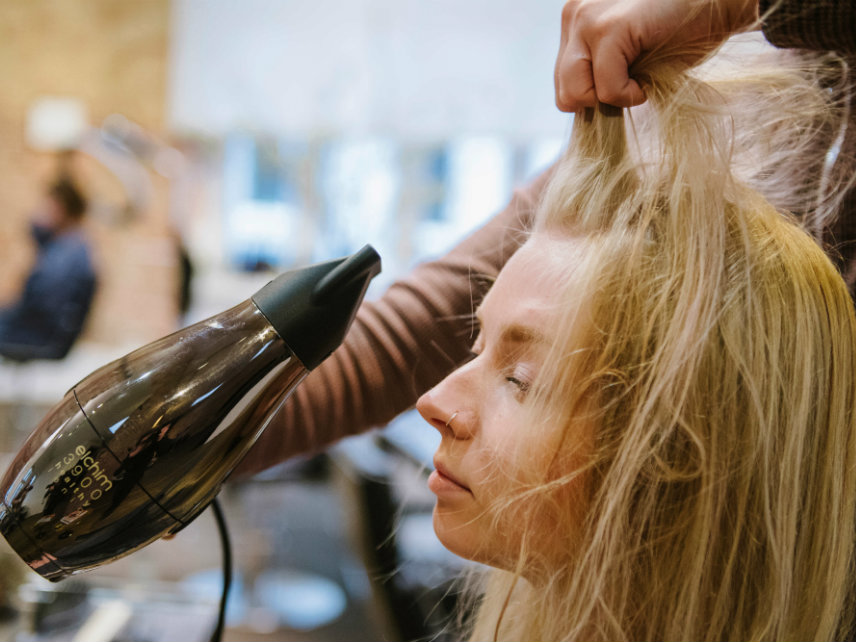Massachusetts Salon Owner Says He Wants to Hire More Workers. Licensing Is the Reason He Can't.
Even entry-level jobs that allow someone to test out the profession have to be filled by licensed professionals.

Frank Zona's family has been in the hairstyling business for more than three generations—since before they arrived in the United States as immigrants from Sicily, where, he jokes, they probably didn't have a government-issued license.
As the owner of a collection of hair salons in the Boston area, Zona employs about 75 people. He'd like to hire more. Licensing requirements, he says, are the main reason why he can't.
If people want to work in Zona's salons, in virtually any capacity, they must first obtain a cosmetologist license from the Commonwealth of Massachusetts. That's true even for positions that don't have anything to do with cutting, coloring, or styling hair. Even shampooing or blow-drying hair, or being a stylist's assistant—the types of entry-level jobs that allow someone to test out the profession before deciding whether to work in it—must be filled only by licensed professionals.
"There's only one way into the industry," Zona told a U.S. House subcommittee at a hearing today: "through a school program leading to a license."
In Massachusetts, that equates to a 1,000-hour training program, at a cost of more than $12,000.
These one-size-fits-all licensing rules make it harder to find new employees. They also contribute to high turnover in the profession, Zona says, because newly minted cosmetologists who never had a chance to try an entry-level job before getting a license often leave the profession because it's different from what they expected. That's not good for businesses, which want a stable workforce, and it's even worse for those workers who wasted thousands of dollars and months of their lives.
Perhaps more so than in any other profession, onerous licensing rules for cosmetologists and hair stylists have to come to symbolize both how absurd government licensing schemes can be and how difficult it can be to repeal or even amend them.
In Arizona, for example, state lawmakers are considering a proposal to exempt blow-drying from the state's cosmetology licensing regime. The argument for the bill is much the same as what Zona laid out in his testimony today: that entry-level jobs posing no health or safety risk to the general public should not be subject to onerous licensing requirements.
"It limits job opportunities. It's a barrier to newcomers in the industry, and it increases the cost of the service. None of which helps the public," says state Rep. Michelle Ugenti-Rita (R-Scottsdale), who sponsored the proposal.
But the bill has been attacked by the head of the Arizona State Board of Cosmetology and by licensed cosmetologists, who claim that simply letting unlicensed individuals use a blow dryer could trigger a "health crisis." More honest critics express concern that the bill would allow unlicensed workers "to take a lot of work from us" by tearing down protectionist rules.
"In many ways, occupational licensing has become one of the major labor policy issues facing today's workforce," Jarrett Dieterle, director of commercial freedom policy for the R Street Institute, a free market think tank, told the House subcommittee today. "One out of four Americans needs a government license to work, and the average license requires almost a year of educational training, passing an exam, and paying over $250 in fees."
Those burdens can fall harder on low-income individuals who might not have the time or money to afford 1,000 hours or more in training classes for a job that they might already know how to do, Dieterle says.
To that end, a number of states have already trimmed licensing requirements for hair-braiding or exempted it entirely from the cosmetology licensing regime. Arizona did that in 2011, over a similar outcry from its cosmetology board and from licensed professionals. There and elsewhere, looser licensing rules have not triggered a public health crisis.
"There is relatively little evidence to show that occupational licensing has actually improved the quality of delivered services in many fields, although it has been shown to increase prices and limit economic output," Morris Kleiner, a University of Minnesota labor economist who has studied licensing, told the subcommittee today.
While Zona says he believes licensing laws do serve some purpose, he'd like to see low-level jobs excluded from the one-size-fits-all requirements.
"It can be a tool to get people in," he says, "instead of keeping people out."


Show Comments (17)